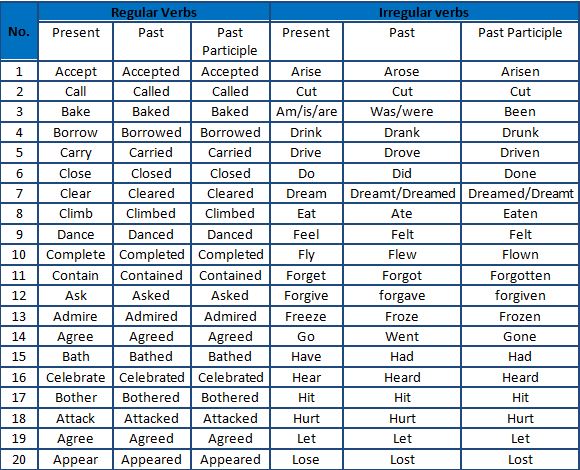
Irregular verbs are a pain because there isn’t one rule you can learn for them.

Most words in the English language follow the rules: today I use, yesterday I us ed. Notice: Undefined index: nejcasteji_pouzivana_slovesa in /home/users/learnivcom//web/index-hp-aj.Over 180 English verbs are called irregular verbs, and they break all the rules. As long as it seems logical to your brain, it will help your memorize the verbs.
EXAMPLES OF ENGLISH IRREGULAR VERBS FREE
However, feel free to create different groups if you like. There are a number of ways to divide irregular verbs in groups. It’s not as sharp as before, so now it sounds like. Let’s assume it’s been some time since you found the diamond (it’s the past now) but you can still hear the pickaxe clunking in your ears. In a similar vein, the past form and past participle of this irregular verb are dug. The more interesting, and silly the story is, the more your brain is likely to remember the verb. The pickaxe will break into a thousand pieces but you’ve found a real gem. As it hits the diamond, your pickaxe makes a loud clunking noise sounding like ‘dig’. Picture this: you’re digging up in a mine when you suddenly find a giant diamond. Take the irregular verb dig, for example. Use your imaginationĬreate a story or a mental picture for each of the verbs. Your brain needs a rest too, so be sure to have a break. Having said that, don’t overstretch yourself trying to study all the time. However, be consistent and make sure you study regularly. This won’t take more than 15 minutes, so you can easily get down to learning the verbs five times a week. Select three to four days a week and schedule a specific time to study. Next morning, start with the revision of the irregular verbs you already know, and add one new to the list.Ĭreate a schedule and be consistent. Choose one verb at a time and repeat it for yourself all day. You can’t possibly learn everything at once.

Read and try to memorize the irregular verbs.Here are just a few: Engage multiple sense while you study. These mental tricks can be very easily applied to learning just about anything, not just irregular verbs. There are several successful tricks to make your brain remember something.

However, they differ in pronunciation and the base form is pronounced differently from the past form and past participle: / /. All three forms of this verb are spelt in exactly the same way.

Some irregular verbs look the same in all three forms, e.g. You can use the regular forms: abide / abided / abidedīut there are also irregular ones: abide / abode / abode While it’s true you may actively use just the regular form, you still need to understand the irregular form when you hear or see it. That means that in fact irregular verbs might have both regular and irregular forms. Sometimes there are multiple forms of a particular English verb, all grammatically correct.


 0 kommentar(er)
0 kommentar(er)
